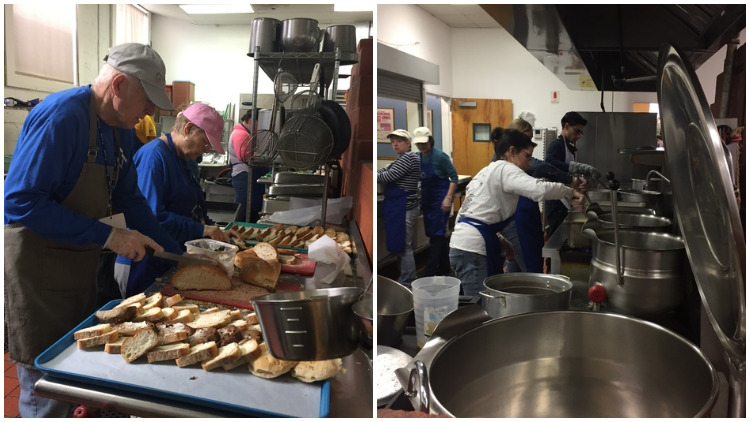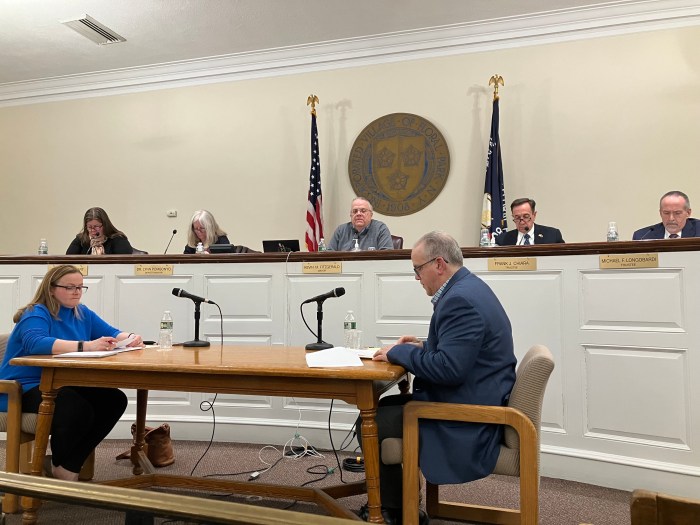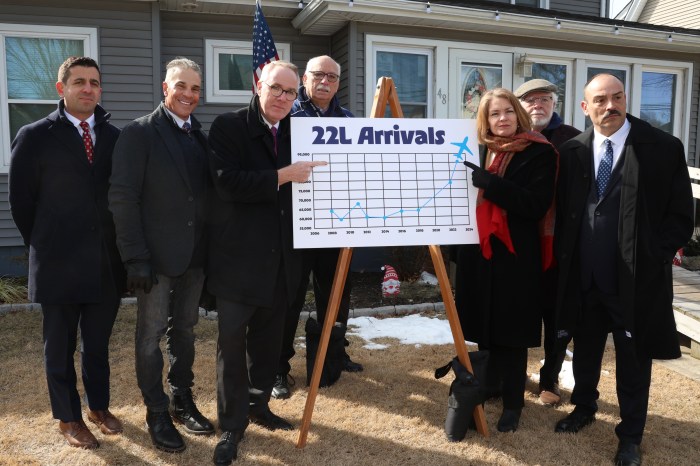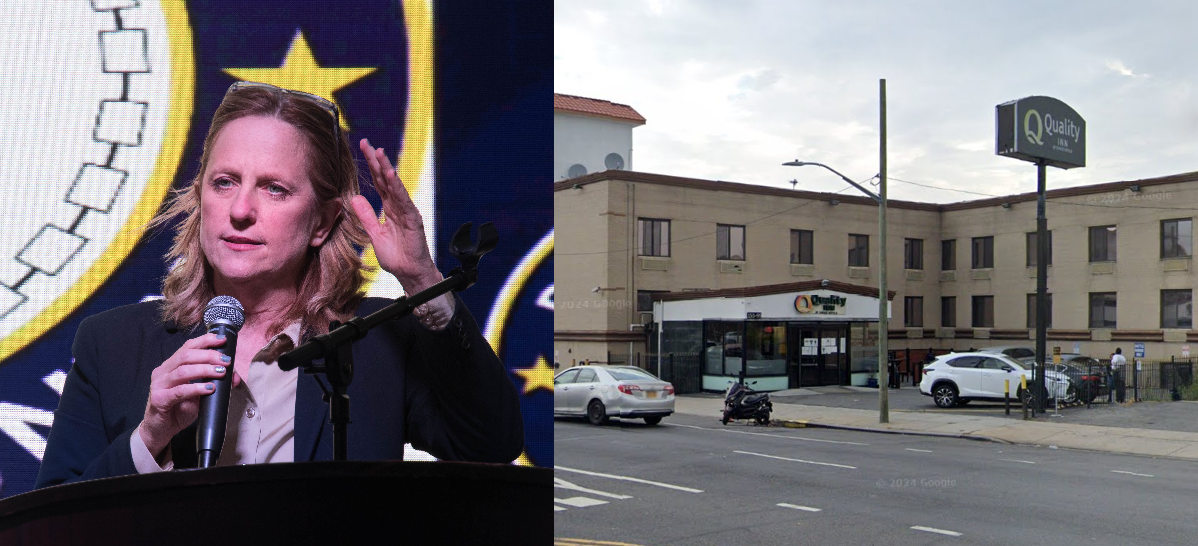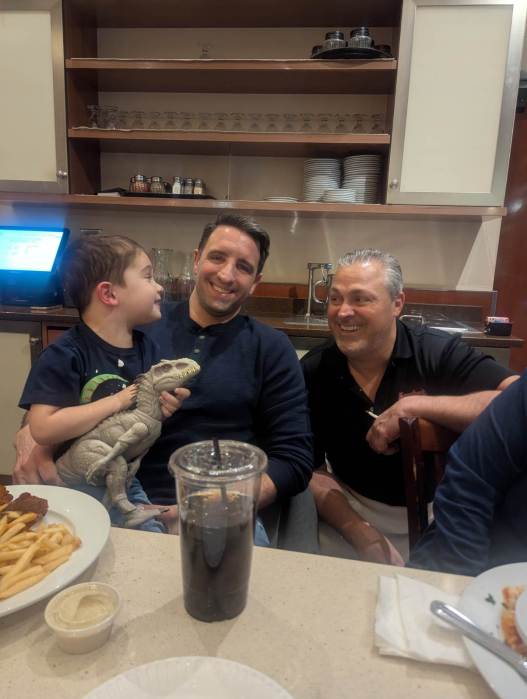News of an oncoming blizzard spread throughout the ranks of the Mary Brennan INN in Hempstead with the speed and urgency fueling any agency on the frontlines of a life-or-death situation tasked with making preparations to save lives.
Jean C. Victor, its manager of 13 years, barked instructions at team members and volunteers in a back room off the bustling kitchen that serves as a conference room, coat closet, and staff room as they ready themselves for the day ahead.
The seasoned crew—some who’d retired and others who’d donated time sandwiched in between their busy daily schedules to lend a hand—followed his directives with lighthearted banter along several stations throughout its large industrial-sized kitchen: An elderly couple sliced fresh loaves of bread. Several women stirred various dishes simmering in pots atop a massive stove. Others chopped vegetables and assembled a salad in a giant metal bowl.
Victor soon headed to an adjacent pantry stocked floor-to-ceiling with cans, bags and containers of all shapes and sizes brimming with countless foodstuffs, awaiting word from The INN’s Executive Director Jean Kelly about whether the nonprofit would be open the following day, when forecasters predicted temperatures would plummet and up to 18 inches of snow and ice would smother the region and shut down Long Island for days.
“Today we [are] going to be giving out the house!” Victor bellowed to the readying staff. “Hats, gloves, food!”
An assembly line of volunteers quickly materialized, with helpers and staff immediately stuffing hundreds of bagged lunches, gathering the warmest clothing and winter gear, and cooking up that day’s hearty meal to feed those in need already lining up.
Kelly, joining Program Manager Nancy Burke in her office at the group’s Center for Transformative Change in a building next door, assessed the latest weather reports on the ominous storm’s severity and made the tough declaration that The INN would in fact be closed during its wrath.
“We know it’s happening,” Kelly said of the impending storm. “It will happen during the exact hours everyone’s trying to get in and out. We need to prepare ahead and de-stress, and the only way we could do that is to get ready and make a plan. And have enough time to make and carry out that plan.”
“Nancy,” she directed, “if we know anyone who is sleeping outside—if we can find a way to get them in, even if it’s to get them a hotel room for the night. Whatever you need to do to get them in.”
“There are a few,” replied Burke.
Similar scenes have played out time and time again at The INN throughout its more than three decades as a refuge for Long Island’s most desperate, no matter the emergency—from daily hardships to unprecedented cataclysms, from manmade catastrophes to natural disasters, the March 14 blizzard being the latest. It’s an everyday commitment among its volunteers to address everyday struggles, and much needed, despite Long Island’s reputation as an affluent suburban paradise replete with beaches, parks and luxurious zip codes.
There were 3,960 homeless throughout Nassau and Suffolk counties in 2016, according to nonprofit Long Island Coalition for the Homeless‘ annual “Homeless Count”—with more than half of those children. Nassau County has a poverty rate of 6 percent and an ALICE rate—short for Asset Limited, Income Constrained, Employed; those who can’t make ends meet without making tough choices regarding basic necessities including food, shelter, child care, transportation and health care—of 25 percent. In Suffolk, it’s 7 percent and 32 percent, respectively, discovered a recent study “ALICE: Study of Financial Hardship” by nonprofit United Way of New York State.
The INN (Interfaith Nutrition Network) is a volunteer-based nonprofit whose mission is to address hunger and homelessness on Long Island by providing food, shelter, long-term housing and supportive services for all those in need. It operates a network of 14 soup kitchens, in 21 locations, serving more than 300,000 meals annually. It runs three emergency shelters in Nassau County—two designated as refuges for homeless families, the other for homeless men. The INN provides 23 formerly homeless families with long-term housing throughout Long Island, offers housing and supportive services to homeless veterans, and works to resolve homelessness overall and ultimately empower families’ self-sufficiency.
The INN’s latest facility, its Center for Transformative Change (CTC), is a one-stop resource center helping individuals successfully navigate multi-tiered, multi-agency services so crucial for the homeless, unemployed or destitute to get back on their feet.
The Mary Brennan INN in Hempstead, where Victor led the storm preparation efforts, is the group’s flagship and the largest soup kitchen on Long Island. Yet while The INN’s many services are unquestionably changing and saving lives, Executive Director Kelly aims to serve an even higher purpose:
Kelly aspires to turn nobodies into somebodies, and quite literally make her job obsolete in the process.
“The greatest thing we can ever say to somebody is ‘We hope we never see you again,’ she explained. “Because it means you don’t need us anymore. And you don’t owe us anything.”
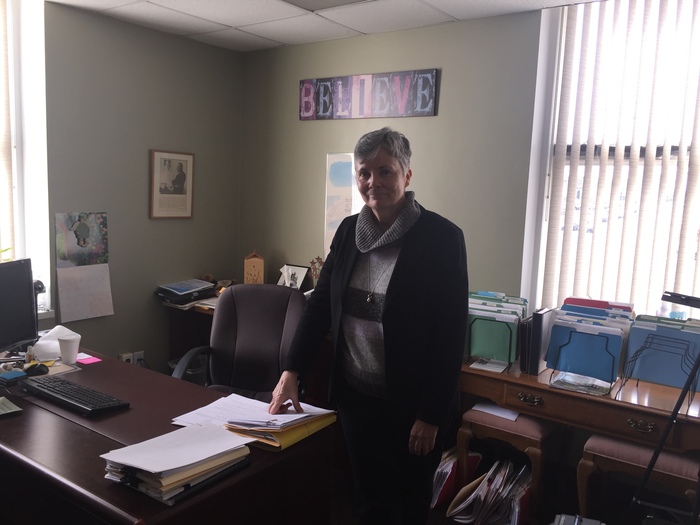
HUMBLE BEGINNINGS
The Mary Brennan INN, the first in Nassau County, began in 1983 at a meeting held at the home of Michael Moran, then a chaplain at Hofstra University, in Uniondale. Kelly attended at the behest of a friend from college, and initially, the only things she was sure of upon arrival was that it seemed to be some kind of cult and she wouldn’t be able to help.
Back then, Kelly had a full-time job in advertising. She thought she could possibly volunteer in the soup kitchen on her free night during the week, but quickly learned that soup kitchens traditionally only operate during the daytime, since they’re typically located in dangerous areas.
So Kelly told Moran she wouldn’t be available to help start his brainchild.
At the time, Long Island’s only soup kitchen was in Wyandanch, in Suffolk County. Moran had been bringing student volunteers weekly into Brooklyn to help at a soup kitchen there. When these students witnessed through their bus window a person their age fishing a half-eaten bagel from a garbage can right in their own county, Moran realized the need to feed the hungry right here. And he knew he could use Kelly’s help.
Moran sat the group of 30 who’d responded to a newspaper ad he had posted in a large circle. He asked them to introduce themselves and to state why they’d come.
The first person offered his name and said, “I saw the ad in the paper. I have two hands. I want to help.” The second and third echoed those sentiments. Kelly, who’d never been to a meeting like this before, became frightened.
“I was with a woman I had just met at school and she had seen the ad in the paper and asked if I wanted to join her,” she recalled. “I barely knew her, but I said yes I would go because I had one night open during the week. And then finally, I thought this is a religious cult. And when she said, ‘I have two hands, I want to help,’ I thought, ‘Oh no! She’s one of them!’
“I was the last person to speak, and I thought, ‘What am I going to say now? What happens if you don’t say the company-speak?’ All I could say was, ‘My name is Jean Kelly. I didn’t see the ad in the paper. I have two hands, but I can’t help because I work.’
“They all looked at me like, ‘Who let her in?’” she explained.
Moran turned and said, “Don’t worry. We’ll find something for you.”
He then asked Kelly to be the “temporary” volunteer committee chairperson.
“I thought: ‘That’s how they do it,’” Kelly told the Press in her office in Hempstead, a sign spelling “BELIEVE” on the wall behind her. “They put you in for just a tiny bit and wait for the real one. Well, it’s 34 years later and I’m still waiting for the real person to show up.”
The INN began with a simple premise that they keep to this day: to feed the hungry, no questions asked. Due to this policy, Kelly can’t tell you exactly whom they serve. This also restricts the nonprofit’s eligibility for many government grants requiring demographic information. Consequently, The INN relies on private donations and annual fundraisers to pay for their soup kitchens, three emergency housing shelters, administration building, and latest addition, the aforementioned Center of Transformative Change.
The INN owns all of the 21 buildings in their organization; none are subsidized by government money. More than 2,000 people volunteer in the organization. They’ve come a long way from raising funds by collecting change inside empty tennis ball containers at area delicatessens, and their financial well-being allows the freedom to give what’s needed to whoever needs it.
This is what legitimizes them, according to Kelly.
“Someone needs this, you have to have the funds to say, ‘Give them the whole thing, and don’t worry if they’re going to rip us off,” she explained. “Yes, every day, we open up and we get ripped off. If you don’t like getting ripped off, this is not the place to come and volunteer, because you are going to see the doors open and people ripping us off.”
In its early days, The INN’s founders approached the 36 religious groups residing in Hempstead. Twenty-one of them agreed to meet, and although each agreed to help in whatever way they could, only the last church they approached offered a kitchen and dining room they could operate the original soup kitchen out of—for $400 per month rent.
Kelly asked the remaining religious groups to take turns covering each month’s rent.
They were in business.
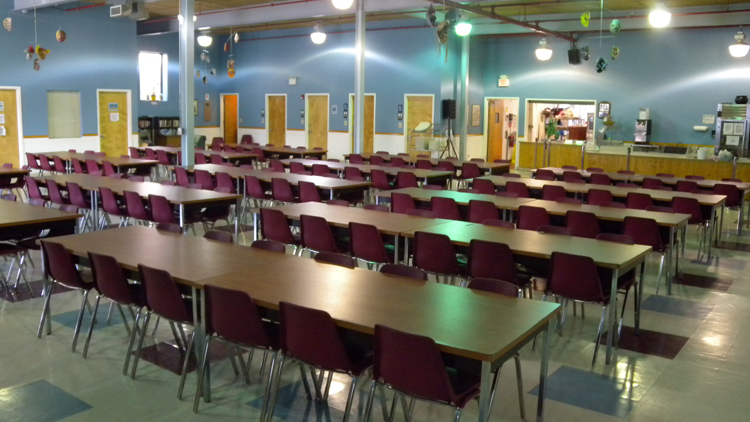
FACELESS, NAMELESS
The INN’s policy of “No Questions Asked” serves to remove any barrier that might prevent someone from visiting for a needed hot meal. It’s a form of respect. It’s a kindness. It’s an unconditional welcome without the fear of being judged. It’s the mark of Jean Kelly and informs the entire culture of the organization.
You won’t find any pictures of The INN’s many guests. Journalists are forbidden from interviewing them. There’ll therefore be no heart-wrenching images of the people on Long Island struggling to feed themselves, who need a place to take a hot shower, who are getting their basic needs met so they can survive another winter accompanying this story.
Likewise, because The INN does not record personal information from their guests, it’s impossible to know whether one of them is holding an order of protection from someone, or if he or she is in hiding. (A published photograph of a guest could have tragic repercussions.)
While at The INN, the guests truly are nobodies. Kelly believes the volunteers who interact with them, however, become reflections of those very people.
“If a guest looked you in the face and you looked back at them, your face is a mirror of the guest,” Kelly told the Press, gesturing to her own face. “So if you want to see what a guest looks like, this is what a guest looks like. Is that good enough for you?”
On a recent tour of The INN’s soup kitchen, its marketing and communications director, Dana Lopez, greeted many of the guests by name as they sat at tables in the kitchen awaiting the day’s meal. Along with 13 other soup kitchens on LI, The Mary Brennan INN serves a hot, five-course meal, five days per week. It’s large, served at midday, and consists of nourishing breads and proteins and carbs—a nice, hearty meal. It’s got to be. For many of the guests, it may be their one and only hot meal that day, so it must be substantial enough to fill them.
These meals’ importance is not lost on The INN’s crew, or its hungry visitors. They hold a sacred moment of silence before each.
Victor’s job as manager for the past 13 encompassed “everything,” he explained.
“What do I do? What don’t I do?” he laughed when asked about his responsibilities.
Victor has not only run the day-to-day operations of the food kitchen, including overseeing the creation of the menu, meal preparation, and ordering, he’s also managed the building itself. A prerequisite was training in conflict resolution and crisis management.
“If something goes down, Jean [Victor] is there to handle it,” explained Lopez.
The Mary Brennan INN is so much more than a soup kitchen. Besides food, they accept lots of different types of other donations as well, so besides the ability to for somebody to walk in off the street and enjoy a hot meal, The INN is also home to a guest-choice library, where guests can escape the elements or their daily struggles within the pages of a good book, or simply reflect. It’s also the only place on Long island where someone can walk in, off the street, and take a hot shower, no questions asked.
The INN even provides them with a towel, toiletries, a toothbrush and toothpaste.
And as its volunteers know all too well, there’s a thin line between being on the giving and receiving ends of The INN’s many services.
Kelly maintains that anyone can find themselves in the position of one of the guests.
“We said 34 years ago when The INN started, that anyone on this side of the counter could be on the street,” said Kelly. “And it has happened.”
She described the devastation plaguing Long Beach in the aftermath of Hurricane Sandy in 2012. Volunteers found themselves without hot water and/or electricity, and came to The INN for showers and meals. Kelly recalled many in tears as they came to the full realization of what it felt like to be without the basics.
After Sandy, Kelly noted many of the guests never came back. The reason, she realized, was that because the Red Cross was on hand to help everyone—those who were homeless and in need both before and after Sandy—people were able to access services more easily, and without judgment.
“They rose up with everyone else because no one else knew they were a guest,” she said.
Sometimes, unprecedented disasters shed light on everyday tribulations.
On September 11, 2001, news of the terror attacks poured in across radios and telephone calls as The INN’s team struggled to prepare the day’s meal. Although there were no televisions, the tragedy unfolding that day and lasting for subsequent weeks and months was vividly embodied in the anxiousness among both volunteers and guests while awaiting calls from loved ones working in or near the World Trade Center.
Kelly recalls one guest in particular. He had asked a volunteer who was distraught with grief and shock for a toothbrush. The volunteer was incredulous. How could someone think of brushing his teeth during such a time?
The guest, Kelly remembered, answered quietly, but with conviction.
“I don’t know anyone in the Twin Towers or the Pentagon,” he’d said. “And I’m sorry. But I have a job interview. And if I don’t brush my teeth, I won’t stand a chance.”
The volunteer recovered.
“Of course,” he replied, handing over the toiletries and looking curiously at the guests who were quiet and respectful but not emotionally traumatized the way the staff was.
“We had to calm the staff down about the fact that the guests did not seem to react as if this was the end of the world,” recalled Kelly. “I said, ’Because in their life, in their world, planes fly through their buildings every day.’”
The work the staff and volunteers do can take a toll on them physically, spiritually and emotionally. Kelly hosts non-mandatory spiritual retreats for them to recharge and reflect. She shares books or information she’s acquired, and encourages everyone to go into silence for two hours each day. In addition to the retreats, Kelly has taken four, four-month-long sabbaticals throughout her career to prevent burnout.
“If you sit down with somebody and hear a horrific thing and you don’t realize you are exposing yourself to vicarious trauma, the same as if you’ve breathed in a different kind of air quality that you need and you don’t do anything as an antidote, you are going to physically at some point not be able to do it anymore,” Kelly told the Press. “It’s like asking someone to get into a boxing ring with Mike Tyson, and they don’t have any gloves on, and Tyson is going to attack them emotionally.”
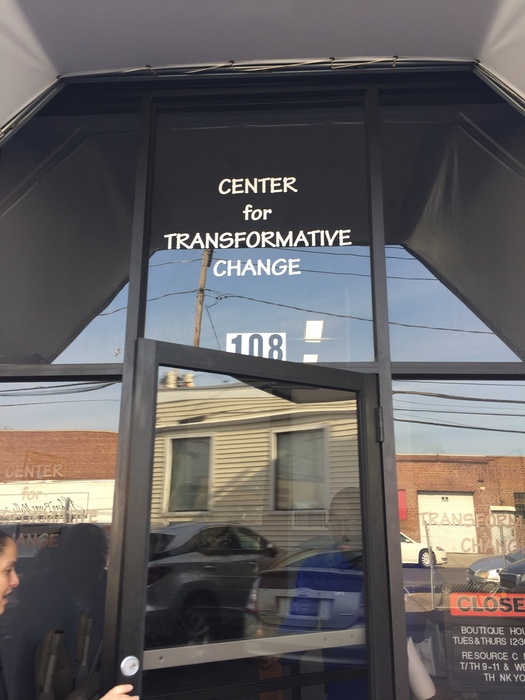
CENTER FOR TRANSFORMATIVE CHANGE
When Nancy Burke walked into The Mary Brennan INN, she felt a sense of belonging she’d never before experienced in her life.
A retired social worker, she wanted to volunteer and contribute something meaningful. Her organizational skills as well as her remarkable, immediate rapport with the guests soon made her an indispensable part of the organization. When the idea of the Center for Transformative Change (CTC) began to take root, it was obvious she was the perfect candidate to run it.
The CTC is the latest development of The INN, and marks a turning point in the organization’s philosophy. At the CTC, they are looking beyond offering help in covering basic survival needs. The Mary Brennan INN’s guests have the opportunity to make an appointment with a trained volunteer at the CTC next door, sit down with them, and try to figure out what’s next.
“Next” could mean a number of different things, such as classes to improve a guest’s English, a computer course to learn basic skills to apply for a job online, furniture, housing, an identification card, transportation, child care, or interview attire.
“What we found is that a lot of our guests are going through this cycle because they can’t find their way out of the system, and a lot of the places they have to go to are really hard to navigate,” Lopez told the Press in a phone interview. “So there are forms that are too confusing to fill out, or they don’t know where the offices are, or just don’t know, and it’s a frustrating process that ends [with] them up right back in the soup kitchen again.”
In order to break that cycle for good, Kelly introduced the CTC. Before its opening in January 2016, Kelly, Burke and some volunteers visited several service agencies on the Island in order to experience firsthand what guests face in each situation. They pretended they needed to obtain identification cards, for example, carefully taking note of how difficult the systems were to navigate—and how they were treated.
The peaked roof of the CTC recalls the church it was before Kelly purchased the building. Inside, up a flight of stairs, open cubicles take up most of the main floor space. In this Resource Center, guests can sit in semi-privacy with a trained volunteer and figure out their next steps.
Sometimes, guests just need to tell their stories to someone who will listen without judgment. Because one of the main criteria for becoming a volunteer at The INN is kindness, that need will be met with ease.
“The volunteers are trained to see where the guests are at,” explained Burke. ”We’re not on the business of prioritizing for them. We’re in the business of listening and helping the person come up with an action plan.”
Down the hallway is the computer lab. Downstairs is the boutique, where 150 to 200 guests per week acquire free clothing, interview attire, housewares and bedding. The CTC also offers enrichment programs, like healthy cooking demonstrations, flu shots, and dental screenings, chair yoga and meditation, and English classes.
The CTC brings in eight agencies to work directly with guests, including the Long Island Coalition for the Homeless, Nassau County Commission on Human Rights, Fidelis Care, United Healthcare, Options for Community Living, the Women’s Bar Association, Literacy Nassau, and the Mental Health Association.
The direct service the CTC offers that is the most valuable for the homeless or those on the edge of homelessness is to get them identification cards, something necessary for applying for public assistance or employment. This is sometimes a months-long, painstaking process funded by a grant from Bethpage Federal Credit Union. Without a social security card, birth certificate, or a non-drivers ID, opportunities are severely restricted. So what may start as a request from a guest to help get a job, may entail volunteers helping to fill out online job applications, setting up an email account, helping with a resume, getting them interview attire, and role-playing job interviews. At the same time, they also work on getting guests their birth certificates.
“And what does identification mean?” asked Kelly. “It means you are somebody. This is who you are. You are somebody. And in our world, you have to show who you are, that you’re a somebody. In their world, they’re nobody. You don’t need ID if you’re a nobody. In the world of nobodies, no one needs to know who you are.”
Dave, 59, was one of the first guests to come into the Center for Transformational Change. He was the first one to take a computer class and to apply online for a job at Home Depot, which involved a confusing 140-word questionnaire the staff patiently assisted him with. He was the first to be dressed by volunteers. He was the first of almost everything, a mark of his personality.
For years, volunteers arrived at the Mary Brennan INN around 8 a.m. to find Dave sitting on the stoop, already waiting for the doors to open at 9:30. The volunteers practiced the interviews with him, and when he had his initial phone interview with Home Depot, they were in the office listening and cheering him on. After his in-person interview, he was hired. He now works about 25 hours a week. The day of his first job evaluation, he rushed right over to the CTC to show the staff.
“It was a beautiful evaluation,” recalled Burke. “We made a copy and put it on our little mini refrigerator. And the other day he got a raise!”
They have recently started a breakfast club, a “job club” that meets every Tuesday morning. Dave has become an ambassador, bringing people from the dining room over to be part of this club. He’s the example of someone who was ready.
“They may not know where they’re sleeping tonight, they may not have any plans of what they’re going to eat, and their health may be in jeopardy, everything might be going wrong, but they’re surviving,” explained Kelly.
“Why more of them don’t end their life each day, it’s a miracle,” she continued. “If you ever understood what they’re actually up against. Any tiny bit of hope is huge for them, because nobody has ever focused on them enough to do anything meaningful. That doesn’t have strings attached. Like, if you give it to them, they feel they owe you. And they can’t afford to owe you, because they have nothing to pay you back with.”
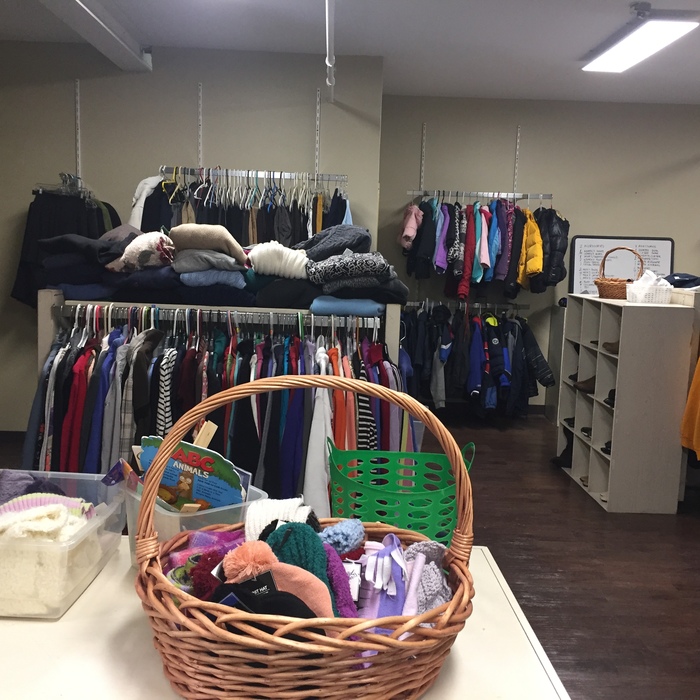
HOPE ENDURES
More than 800 guests have visited the CTC for various needs in its first year. More than 700 of them have returned for follow up visits.
Although Jean Kelly cannot tell you exactly who they are serving in their soup kitchens, she can officially report that last year, they served 10,000 less people than the previous.
She’s not out of business, not yet. But she’s working on it.
“We treat people with respect,” Kelly told the Press. “People use what we give them and they get on their way and that’s what we want… You don’t have to come back and pay us back. If you can help anybody, walk that way and help people, but don’t come back to the scene of an accident, because whatever’s going on in your life was like an accident, and we need you to feel empowered.
“We can get through this,” she continued. “We can help you. And we are honored and privileged to walk you through the process, and tell other people on your way, if you meet people who need help, tell them to come. But we’re trying to go out of business so that we’re not needed.
“Everyone says, ‘You can’t go out of business.’ It even says in the Bible, ‘The poor will always be with you.’ I say, ‘Yeah, but there was an asterisk at the end of the line. The poor will always be with you, but they’re not supposed to be the same ones.'”
Featured Photo: Volunteers prepare the day’s meal for guests at The INN (Interfaith Nutrition Network) in Hempstead ahead of a recent oncoming blizzard. (Photos: Long Island Press / Jaime Franchi)



